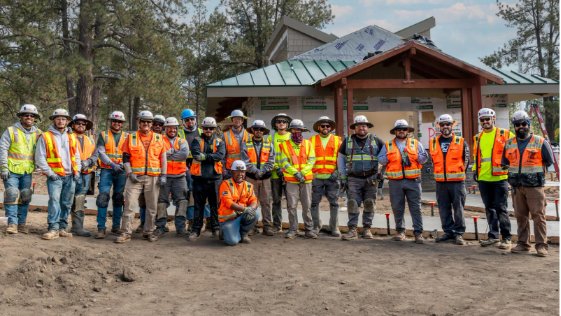After nearly two years of managing the workplace through the nationwide COVID-19 pandemic, employers are being impacted by another significant challenge: the “Great Resignation,” which is the recent trend of workers voluntarily resigning from their jobs en masse beginning in 2021 and continuing today. Employers across a number of industries, including construction, are facing the pressure of recruiting, hiring, onboarding, and integrating job candidates in record speed to fill vacancies and meet the operational needs of the business.
Employers have been forced to rethink their recruiting and hiring processes, including pre-employment screening processes that may impact the timing of offers of employment. At the same time, the laws across the country related to these processes have been changing dramatically over the last few years. In light of operational challenges and the shifting legal landscape, how should employers be evaluating their recruiting and hiring processes and what should they consider when doing so?
Drug Testing
One screening tool that construction companies often use for safety-sensitive positions is pre-employment drug testing, which is often a key part of workplace safety programs. Some employers may also be required to implement drug testing policies and requirements under agency regulations (e.g., Department of Transportation), laws or contractual obligations.
Over the last few years, there has been a significant shift in the manner in which marijuana is viewed in the United States, which has resulted in some employers debating whether to continue pre-employment drug testing as it relates to marijuana or pre-employment drug testing at all. While marijuana still remains illegal under federal law, states and localities continue to reduce penalties related to marijuana use and consumption.
At present, 31 states and Washington D.C. have decriminalized small amounts of marijuana for personal use and 18 states and Washington, D.C., permit recreational use of marijuana, to varying degrees. Further, some states and cities have placed limitations on employers’ ability to engage in pre-employment drug testing for marijuana, with exceptions. For example, Philadelphia and New York City have banned employers from conducting pre-employment drug testing for marijuana. However, employers should note that many drug testing laws provide exemptions for certain categories of employers or employees (such as for those in safety-sensitive positions), or when drug testing is required pursuant to a federal or state law, regulation or order.
These legal changes may result in an increase in individuals using marijuana off-duty and subsequently testing positive in a pre-employment drug screening; drug-testing programs may also act as a deterrent for individuals who are concerned about interference with off-duty marijuana use.
For employers reviewing their pre-employment drug testing programs, it is important to consider:
- the needs for such programs in light of the workplace and the particular position(s);
- the risks to safety of removing such screenings;
- the impact of other drug testing to mitigate the risk of removing pre-employment drug testing (e.g., random, post-accident, reasonable suspicion testing);
- the drug and alcohol panel itself and what substances are included;
- the impact of any such changes on insurance, including workers’ compensation; and
- any legal or contractual obligations, among other considerations.
Background Checks
Similarly, many employers rely on background checks to determine an employee’s fitness for employment, which often includes criminal background checks. In this area as well, some states and cities have been enacting laws restricting an employer’s ability to perform background checks. For example, under New York City’s Fair Chance Act (FCA), rather than running full background checks after a conditional offer has been made, New York City employers must evaluate all non-criminal pre-employment information, such as references, prior employment and educational degrees, before a conditional offer of employment is made. Once a conditional offer is made, employers may then request and review all criminal history information in compliance with the individualized assessment, notice, and consideration requirements of the FCA. Additionally, many states maintain “ban-the-box” laws, which generally restrict employers from asking about potential employees’ conviction records. On the other hand, many employers are required to conduct background checks pursuant to government regulations, insurance carriers or their clients and customers.
There are advantages and disadvantages to conducting background checks, which depend largely on the employer, the particular position and the industry. On one hand, background checks are expensive, can impact the speed with which candidates can be hired, and might include inaccurate or false information or information that is not relevant to the position. On the other hand, background screenings increase the amount of information from which the employer can make an informed decision on whether the applicant will be a good fit for the company. Such checks can also reduce long-term costs to the employer by weeding out applicants who may not be suitable for a particular employer or position before they are onboarded, trained and integrated, thus decreasing employee turnover. Furthermore, using tools such as background screenings can potentially shield employers from liability for claims related to negligent hiring.
Other Pre-Employment Screenings
Other pre-employment screenings, such as employment verifications, professional references, motor vehicle records, aptitude tests and personality assessments, can present similar issues and risks for employers. Employers may wish to evaluate whether the measures currently being used are effective and, if not, how they should be changed in light of their priorities, the need for competent workers, costs, industry practices, the risks associated with foregoing screenings or adding new screenings, and the workplace culture. Employers also will need to stay informed about relevant laws and regulations that might mandate or restrict the employer’s implementation of these processes.
Conclusion
Today’s labor market may be placing pressure to hire quickly, but employers reviewing their pre-employment screening process should weigh all applicable factors, and the impact of any such changes on the short- and long-term, before implementing changes. Furthermore, employers with multi-state workforces should ensure that their pre-employment screening processes are consistent with applicable law.







